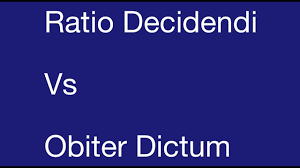
When it comes to the interpretation of any case, understanding the components of the decision will be necessary.
However, we have to look at several components of a decision.
The latin expression “ratio decidendi” is one of the most important phrases used in law. It stands for the “legal principle”, “the reason behind the decision” or “the rationale of the case”.
In essence, this is the important legal maxim drawn from the case. It is the essential part of the decision. Less important matters, or matters which are not material are unnecessary. They are non-essential, and often referred to as “obiter dicta” or “obiter” for short.
The ratio decidendi:
•· represents the essential elements of the case
•· recites the fundamental issues in the case
•· requires a conclusion based of the actual facts in the case
•· is necessary to the logic of the decision
•· formulates the legal principles decided in the case
In short, it is the “holding” in a case, or the decision that the court held in a particular case.
The binding part of the case must be part of the ratio decidendi. The legal doctrine of stare decisis requires lower courts to follow the principles of the law enunciated by the higher courts. If the fact or principle is part of the ratio decidendi, then it is binding upon lower courts. If it is merely obiter dicta, then it is not binding.
Fundamentally, one of the roles of the judiciary is to determine in every case that which is part of the ratio, and that which is obiter. This is also the task of lawyers in subsequent cases.
A lawyer confronted with a difficult decision pronounced in a superior court will need to distinguish the case, from the one at bar. One of the opportunities is to argue that the superior court decision contained obiter on the point in issue.
It is also noteworthy that obiter of a very high court, or leading jurist is quite persuasive, and sometimes more significant that the ratio decidendi of another lower court.
Litigation often revolves around the distinction between ratio and obiter, and stare decisis hangs in the balance.
This is one of the most difficult challenges in the adversarial judicial system. If it weren’t, there would be no need for lawyers.
Brian Madigan LL.B., Broker
